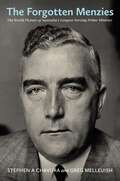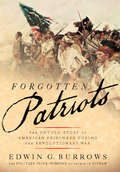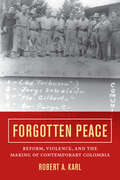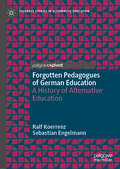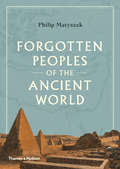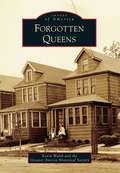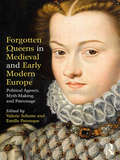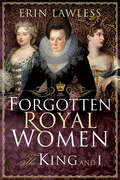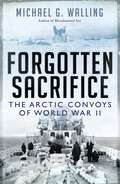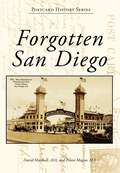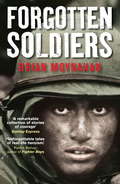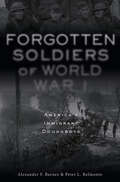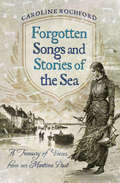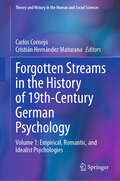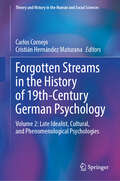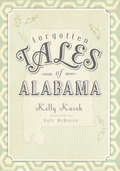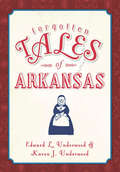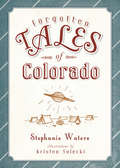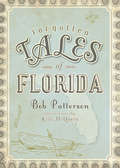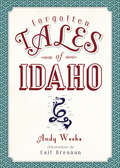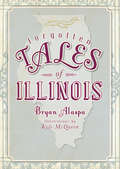- Table View
- List View
Forgotten Menzies: The World Picture of Australia's Longest-Serving Prime Minister
by Stephen Chavura Greg MelleuishSir Robert Gordon Menzies was the founder of the Liberal Party of Australia. As well as being Australia's longest-serving prime minister, Menzies was the most thoughtful. Menzies' world picture was one where Britishness was the overriding normative principle, and in which cultural puritanism and philosophical idealism were pervasive. Unless we remember this cultural background of Menzies' thought then we will seriously misunderstand what he meant by the very project of liberalism. The Forgotten Menzies argues that Menzies' greatest aspiration was to protect the ideals of cultural puritanism Australia from two kinds of materialism: communism; and the mindset encouraged by affluence and technological progress. Central to Menzies' project of cultural and civilisational preservation was the university, an institution he spent much of his career extolling and expanding. The Forgotten Menzies makes an important contribution to the history of political thought and ideology in Australia, as to understanding the largely forgotten but rich intellectual origins of the Liberal Party.
Forgotten Patriots: The Untold Story of American Prisoners During the Revolutionary War
by Edwin G. BurrowsBetween 1775 and 1783, some 200,000 Americans took up arms against the British Crown. Just over 6,800 of those men died in battle. About 25,000 became prisoners of war, most of them confined in New York City under conditions so atrocious that they perished by the thousands. Evidence suggests that at least 17,500 Americans may have died in these prisons--more than twice the number to die on the battlefield. It was in New York, not Boston or Philadelphia, where most Americans gave their lives for the cause of independence. New York City became the jailhouse of the American Revolution because it was the principal base of the Crown’s military operations. Beginning with the bumper crop of American captives taken during the 1776 invasion of New York, captured Americans were stuffed into a hastily assembled collection of public buildings, sugar houses, and prison ships. The prisoners were shockingly overcrowded and chronically underfed--those who escaped alive told of comrades so hungry they ate their own clothes and shoes. Despite the extraordinary number of lives lost, Forgotten Patriots is the first-ever account of what took place in these hell-holes. The result is a unique perspective on the Revolutionary War as well as a sobering commentary on how Americans have remembered our struggle for independence--and how much we have forgotten.
Forgotten Peace: Reform, Violence, and the Making of Contemporary Colombia
by Robert A. KarlForgotten Peace examines Colombian society’s attempt to move beyond the Western Hemisphere’s worst mid-century conflict and shows how that effort molded notions of belonging and understandings of the past. Robert A. Karl reconstructs encounters between government officials, rural peoples, provincial elites, and urban intellectuals during a crucial conjuncture that saw reformist optimism transform into alienation. In addition to offering a sweeping reinterpretation of Colombian history—including the most detailed account of the origins of the FARC insurgency in any language—Karl provides a Colombian vantage on global processes of democratic transition, development, and memory formation in the 1950s and 1960s. Broad in scope, Forgotten Peace challenges contemporary theories of violence in Latin America.
Forgotten Pedagogues of German Education: A History of Alternative Education (Palgrave Studies in Alternative Education)
by Ralf Koerrenz Sebastian EngelmannThis book introduces six pedagogues from the German context to an English-speaking audience, and demonstrates their significant contribution to the field of alternative education. First and foremost, the authors emphasise the importance of understanding the history of education, to realise that in fact what we understand as ‘normal’ today is by no means the only course history could have taken. The quest for alternative ways of schooling goes back to the late eighteenth century, where educational thinkers advocated various approaches in the face of rapid societal change. The chosen six thinkers are not well known in the English-speaking scientific community, and some are even infrequently cited in the German context. In offering an historic and systematic introduction to concepts that can frame Alternative Education in different ways, this book allows the reader to critically reevaluate present forms of education by using the past as a mirror.
Forgotten Peoples of the Ancient World
by Philip MatyszakA chronicle of forty forgotten ancient civilizations which highlights the important contributions that each has made to modern society. The ancient world of the Mediterranean and the Near East saw the birth and collapse of great civilizations. While several of these are well known, for all those that have been recorded, many have been unjustly forgotten. Our history is overflowing with different cultures that have all evolved over time, sometimes dissolving or reforming, though ultimately shaping the way we continue to live. But for every culture that has been remembered, what have we forgotten? This thorough guide explores those civilizations that have faded from the pages of our textbooks but played a significant role in the development of modern society. Forgotten Peoples of the Ancient World covers the Hyksos to the Hephthalites and everyone in between, providing a unique overview of humanity’s history from approximately 3000 BCE–550 CE. A wide range of illustrated artifacts and artworks, as well as specially drawn maps, help to tell the stories of forty lost peoples and allow readers to take a direct look into the past. Each entry exposes a diverse culture, highlighting their important contributions and committing their achievements to paper. Forgotten Peoples of the Ancient World is an immersive, thought-provoking, and entertaining book for anyone interested in ancient history.
Forgotten Queens (Images of America)
by Kevin Walsh Greater Astoria Historical SocietyIn the early years of the 20th century, Queens County underwent an enormous transformation. The Queensboro Bridge of 1909 forever changed the landscape of this primarily rural area into the urban metropolis it is today. Forgotten Queens shows New York’s largest borough between the years 1920 and 1950, when it was adorned with some of the finest model housing and planned communities anywhere in the country. Victorian mansions, cookie-cutter row houses, fishing shacks, and beachside bungalows all coexisted next to workplaces and commercial areas. Beckoning with the torch of the new century and a bright promise for those who dared to pioneer its urban wilderness, Queens flourished as a community. Through vintage photographs being seen by the public for the first time, the five wards of Queens are highlighted for their unique character and history.
Forgotten Queens in Medieval and Early Modern Europe: Political Agency, Myth-Making, and Patronage
by Valerie Schutte Estelle ParanqueForgotten Queens in Medieval and Early Modern Europe examines queens dowager and queens consort who have disappeared from history or have been deeply misunderstood in modern historical treatment. Divided into eleven chapters, this book covers queenship from 1016 to 1800, demonstrating the influence of queens in different aspects of monarchy over eight centuries and furthering our knowledge of the roles and challenges that they faced. It also promotes a deeper understanding of the methods of power and patronage for women who were not queens, many of which have since become mythologized into what historians have wanted them to be. The chronological organisation of the book, meanwhile, allows the reader to see more clearly how these forgotten queens are related by the power, agency, and patronage they displayed, despite the mythologization to which they have all been subjected. Offering a broad geographical coverage and providing a comparison of queenship across a range of disciplines, such as religious history, art history, and literature, Forgotten Queens in Medieval and Early Modern Europe is ideal for students and scholars of pre-modern queenship and of medieval and early modern history courses more generally.
Forgotten Royal Women: The King and I
by Erin LawlessBehind-the-throne biographies of royal sisters, mothers, and others. It&’s said that behind every great man is a woman, and what man is greater than the king? For centuries, royal aunts, cousins, sisters and mothers have watched history unfold from the shadows, their battlefields the bedchamber or the birthing room, their often short lives remembered only through the lens of others. But for those who want to hear them, great stories are still there to be told: the medieval princess who was kidnapped by pirates; the duchess found guilty of procuring love potions; the queen who was imprisoned in a castle for decades. Bringing thirty of these royal women out of the shadows, along with the footnotes of their families, this collection of bite-sized biographies will tell forgotten tales and shine much needed light into the darkened corners of women&’s history—and reminds us that British history is more than just a chain of Edwards and Henrys and Georges.
Forgotten Sacrifice: The Arctic Convoys of World War II
by Michael WallingHitler called Norway the "Zone of Destiny" for Nazi Germany because convoys from Churchill's Britain and Roosevelt's United States supplied Stalin's Soviet Russia with critical equipment and foodstuffs during the darkest days of the German invasion.The words "Murmansk Run" conjure visions of ice-laden ships and thoughts of freezing to death in seconds. For five long years, thousands of men and women fought ferociously in the coldest corner of hell on earth. Some fought for survival, some struggled to help others survive, and some sought to crush their enemies. If man-made death didn't get you, the Arctic's weapons of ice and cold would. These natural weapons killed regardless of whose side you were on or how just was your cause. No one escaped unscathed. Author Mike Walling captures the Arctic convoys' bitter essence in Forgotten Sacrifice. The story launches in October 1939, when Germany and the Soviet Union began diplomatic maneuvering. The action accelerates with Winston Churchill's decision in 1941 to provide supplies to Soviet forces battling the German invasion. From this point until the closing days of WWII in spring 1945, an unremitting sea battle raged within the confines of the always-lethal, ever-shifting Arctic ice pack and the savage Scandinavian coastline. Nearly 4.5 million tons of supplies were moved in 77 convoys over the course of 5 years in order to help the Soviet war effort. The Allies fought to keep the sea lanes open to Murmansk while the Germans were determined to slaughter every ship which dared to make the attempt. By the end of the convoys, 98 ships had been lost. Forgotten Sacrifice reveals a timeless tale of determination, heroism, sacrifice, and the strength of the human spirit.From the Hardcover edition.
Forgotten San Diego (Postcard History Series)
by David Marshall Eileen MagnoMemories are fleeting, and a region's history can easily be forgotten. This book features over 200 unique and interesting historical postcards that vividly capture San Diego County's forgotten past from 1890 to 1990. From bowling alleys to military bases, from giant dirigibles to sleek airplanes, from billionaires to bulldogs--San Diego has changed so fundamentally that much of its charming history has faded from our memories. Forgotten San Diego showcases the unique evolution of San Diego and its neighboring cities, making sure that the triumphs, tragedies, and oddities of this region live on.
Forgotten Schools: Right to Basic Education for Children on Farms in South Africa
by Human Rights WatchThe South African government is failing to protect the right to a primary education for children living on commercial farms by neither ensuring their access to farm schools nor maintaining the adequacy of learning conditions at these schools. This violates South Africa's 1996 South African Schools Act (Schools Act), the National Education Policy Act, and its obligations under the Convention on the Rights of the Child. Receiving an education is compulsory for all children up to grade nine or age fifteen, depending on whichever comes first. The historical, social and economic conditions on commercial farms, inherited from years of an undemocratic minority government, mean that farm schools public schools on private commercial farms, which constitute 13 percent of all state-funded schools and provide education to about 3 percent of learners in the public school system are among the poorest in financial resources, physical structure and quality in South Africa. Farm children may attend schools without electricity, drinking water, sanitation, suitable buildings or adequate learning materials. Also, children may face harassment from farm owners.
Forgotten Skills of Cooking: 700 Recipes Showing You Why the Time-honoured Ways Are the Best
by Darina AllenWinner of the Andre Simon Food Book Award 2009.Darina Allen has won many awards such as the World Gourmand Cookbook Award 2018, the Award for Outstanding Contribution to the Irish Culinary Sector by Euro-Toques, the UK Guild of Food Writers Lifetime Achievement Award and the 2018 Guaranteed Irish Food Hero Award.'There's not much this gourmet grande dame doesn't know.' Observer Food MonthlyIn this sizeable hardback, Darina Allen reconnects you with the cooking skills that missed a generation or two. The book is divided into chapters such as Dairy, Fish, Bread and Preserving, and forgotten processes such as smoking mackerel, curing bacon and making yogurt and butter are explained in the simplest terms. The delicious recipes show you how to use your home-made produce to its best, and include ideas for using forgotten cuts of meat, baking bread and cakes and even eating food from the wild. The Vegetables and Herbs chapter is stuffed with growing tips to satisfy even those with the smallest garden plot or window box, and there are plenty of suggestions for using gluts of vegetables. You'll even discover how to keep a few chickens in the garden. With over 700 recipes, this is the definitive modern guide to traditional cookery skills.
Forgotten Skills of Cooking: 700 Recipes Showing You Why the Time-honoured Ways Are the Best
by Darina AllenBased on the hugely popular courses at Darina Allen's Ballymaloe Cookery School, this book reveals the lost art of making creamy butter and yoghurt, keeping a few hens in the garden, home-curing and smoking bacon, and even foraging for food in the wild.So many of our happiest childhood memories are connected to food. Rediscover the flavours of all-time favourites such as traditional stuffed roast chicken, figgy toffee pudding, and freshly baked scones with strawberry jam. Darina also offers lots of thrifty tips for using up leftovers in delicious ways.Essential reading for urban and rural dwellers alike, this is the definitive modern guide to traditional cookery skills.'There's not much this gourmet grande dame doesn't know.' Nigel Slater, Observer Food Monthly'Our first lady of food.' The Irish Independent'Ireland's answer to Delia and Nigella.' Sunday Telegraph Stella magazine
Forgotten Skills of Cooking: 700 Recipes Showing You Why the Time-honoured Ways Are the Best
by Darina AllenBased on the hugely popular courses at Darina Allen's Ballymaloe Cookery School, this book reveals the lost art of making creamy butter and yoghurt, keeping a few hens in the garden, home-curing and smoking bacon, and even foraging for food in the wild.So many of our happiest childhood memories are connected to food. Rediscover the flavours of all-time favourites such as traditional stuffed roast chicken, figgy toffee pudding, and freshly baked scones with strawberry jam. Darina also offers lots of thrifty tips for using up leftovers in delicious ways.Essential reading for urban and rural dwellers alike, this is the definitive modern guide to traditional cookery skills.'There's not much this gourmet grande dame doesn't know.' Nigel Slater, Observer Food Monthly'Our first lady of food.' The Irish Independent'Ireland's answer to Delia and Nigella.' Sunday Telegraph Stella magazine
Forgotten Soldiers
by Brian MoynahanForgotten Soldiers is an enthralling work of military history that shows how the courage, intelligence or simple good fortune of the individual can exert a decisive influence on the outcome of a battle or campaign. It tells the stories of fifteen unsung heroes, none of a rank higher than major, whose deeds changed the course of important battles and - arguably - the course of history. These vivid and gripping accounts - largely drawn from the Second World War, but with tales too from other conflicts - have each been selected to illustrate one of the dictums of the great Prussian theorist of war, Carl von Clausewitz, about the importance of having the right man in the right place at the right time. From the Roman standard bearer who plunged into the waves off Deal in 55 BC, saving Julius Caesar's military honour and political career, to the young Israeli tank lieutenant who almost single-handedly stalled the advancing Syrian armour in 1973, these are above all tales of courage. But it is not just courage that wins wars, as these stories demonstrate: such elements as surprise, determination, good intelligence, chance, insight, inventiveness and clear thinking all play their parts in eventual victory. And it may only take one man, often of lowly rank, his name largely forgotten, to embody such qualities for the effect to be felt around the world.
Forgotten Soldiers of WWI: America's Immigrant Doughboys
by Alexander F. Barnes Peter L. BelmonteDuring World War I, hundreds of thousands of foreign-born soldiers served in the US military
Forgotten Songs and Stories of the Sea: A Treasury of Voices from our Maritime Past
by Caroline RochfordA collection of fascinating folklore and maritime trivia about pirates, explorers, naval battles, shipwrecks, sea monsters, and more. Stirring tales of heroism at sea have been ingrained in the annals of maritime history from time immemorial. Christopher Columbus&’s discovery of the New World, Queen Elizabeth I&’s defeat of the Spanish Armada, and Horatio Nelson&’s victory at Trafalgar are just some of Britain&’s most memorable naval triumphs. But what about the lesser-known tales from its seafaring past? The Victorian who invented a swimming machine in order to cross the English Channel; the capture of a real-life mermaid; the lost pirate treasure of Alborn; the ghost of a murdered sailor who still haunts the streets of Portsmouth; and the daring explorers who vanished into the blue yonder, leaving behind nothing but a cryptic message in a champagne bottle—these are just some of the quirky naval stories that have been chronicled in verse and archived in newspaper clippings, and forgotten with the passage of time. Historian and genealogist Caroline Rochford has compiled 200 traditional songs and stories into this book, which offers an exciting, entertaining and eye-opening glimpse into a long-lost maritime past.
Forgotten Streams in the History of 19th-Century German Psychology: Volume 1: Empirical, Romantic, and Idealist Psychologies (Theory and History in the Human and Social Sciences)
by Carlos Cornejo Cristián Hernández MaturanaThe 19th century was a defining era for psychology, rich with an intellectual diversity that shaped modern thought but which remains largely overlooked. The roots of 20th century thought can be traced to the 19th century, when a mechanical worldview took hold, society grew increasingly secular, modern urban metropolises emerged, and evolutionist ideas reshaped the understanding of nature’s developmental principles. Throughout this century, the natural sciences extended beyond their traditional limits, influencing and reshaping the human, moral, and social sciences, among which psychology was especially impacted, as this transformation sparked profound debates on the very possibility of a science of the soul. Forgotten Streams in the History of 19th-Century German Psychology recovers the vibrant roots of psychology in empiricism, romanticism, idealism, phenomenology, among other streams of thought that explored consciousness, the soul, and the self before experimental psychology took center stage. Unlike the standard view, this book invites readers to reconsider psychology’s history, revealing a complex landscape that questions the simplistic story of a linear path toward empiricism. Through profiles of significant yet forgotten thinkers, this work uncovers how their ideas contributed to discussions of the unconscious, mind-body duality, and inner experience. Written by leading scholars, each chapter offers a unique window into an intellectual movement that continues to influence debates in psychology, philosophy, and beyond. Essential for historians, psychologists, and anyone curious about psychology’s deeper origins, Forgotten Streams is an indispensable reference that fills an important gap, enriching our understanding of psychology’s complex and multifaceted development.
Forgotten Streams in the History of 19th-Century German Psychology: Volume 2: Late Idealist, Cultural, and Phenomenological Psychologies (Theory and History in the Human and Social Sciences)
by Carlos Cornejo Cristián Hernández MaturanaThe 19th century was a defining era for psychology, rich with an intellectual diversity that shaped modern thought but which remains largely overlooked. The roots of 20th century thought can be traced to the 19th century, when a mechanical worldview took hold, society grew increasingly secular, modern urban metropolises emerged, and evolutionist ideas reshaped the understanding of nature’s developmental principles. Throughout this century, the natural sciences extended beyond their traditional limits, influencing and reshaping the human, moral, and social sciences, among which psychology was especially impacted, as this transformation sparked profound debates on the very possibility of a science of the soul. Forgotten Streams in the History of 19th-Century German Psychology recovers the vibrant roots of psychology in empiricism, romanticism, idealism, phenomenology, among other streams of thought that explored consciousness, the soul, and the self before experimental psychology took center stage. Unlike the standard view, this book invites readers to reconsider psychology’s history, revealing a complex landscape that questions the simplistic story of a linear path toward empiricism. Through profiles of significant yet forgotten thinkers, this work uncovers how their ideas contributed to discussions of the unconscious, mind-body duality, and inner experience. Written by leading scholars, each chapter offers a unique window into an intellectual movement that continues to influence debates in psychology, philosophy, and beyond. Essential for historians, psychologists, and anyone curious about psychology’s deeper origins, Forgotten Streams is an indispensable reference that fills an important gap, enriching our understanding of psychology’s complex and multifaceted development.
Forgotten Tales of Alabama (Forgotten Tales)
by Kelly KazekFrom Muscle Shoals to Montgomery to Mobile, there's just no place quite like Alabama. Take a journey off the beaten path through the Cotton State with author Kelly Kazek as she uncovers the stories that make Alabama one of a kind. Kazek, a longtime Alabama resident, unearths tales that have existed only in rumor, anecdote, legend and lore. This collection is packed with little-known stories of strange sites, like the world's largest Nehi bottle; curious critters, like the first monkey in space; and colorful characters, such as the outlaw Tom Clark. Whether funny, far-fetched, gripping or grisly, Forgotten Tales of Alabama is filled with stories you won't soon forget.
Forgotten Tales of Arkansas (Forgotten Tales)
by Karen J. Underwood Edward L. UnderwoodTake a journey through Arkansas' forgotten past and find the colorful characters, unusual stories and strange occurrences left out of conventional history books. Authors Edward and Karen Underwood weave fact and fun in this offbeat, gripping and little-known history of the Natural State. Discover the Tantrabobus monster rumored to lurk in the hills of the Ozarks, meet the imposters who faked the state's first history museum and learn the story behind Arkansas' lost amusement park, Dogpatch, USA. Truth really is stranger than fiction in Arkansas, and this one-of-a-kind state has the stories to prove it
Forgotten Tales of Colorado (Forgotten Tales)
by Stephanie WatersWild characters, diverse cultures, spooky myths and slippery sales schemes color Colorado's past. In a place where shameless showdowns and dusty shootouts over money, drink and women were once standard procedure, storytelling around campfires became an integral part of a rich heritage. From the jackalope and vampires to Indian curses and snake oil salesmen, the Centennial State has it all. Weirder still are the strange but true stories like that of the first body buried in La Junta's Fairview Cemetery, a man who landed there for refusing alcohol to a kid, and that of the hotel in Telluride that once offered a promotion that included funeral costs with your stay. While history may have neglected these silly, seedy and salacious stories, author Stephanie Waters has rediscovered Colorado's best forgotten tales.
Forgotten Tales of Florida (Forgotten Tales)
by Bob PattersonWith such a rich and significant history, it�s only natural that some of the best stories from the Sunshine State have been forgotten over time. Thankfully, master storyteller and St. Augustine resident Bob Patterson offers this collection of thestrangest, most fascinating stories and legends in Florida�s history from coast to coast, swamp to swamp. Enjoy the saga of William Ellis, a North Florida nature whisperer who escaped from his nursing home with the help of his varmint friends; step into the murk and mystery of the vanishing tribes of the Everglades; and could there really be gator-hungry sharks lurking in the St. John�s River? These stories and so many moreawait when you explore the Forgotten Tales of Florida.
Forgotten Tales of Idaho (Forgotten Tales)
by Andy Weeks Cait BrennanIdaho was the forty-third state admitted to the Union, but it just might lead the nation in strange stories and offbeat legends. Author and Idaho resident Andy Weeks fills this collection of tales with stories ranging from compelling and heartfelt to outlandish and bizarre. Discover the boxcar that carried the alleged body of John Wilkes Booth through Idaho. Uncover the identity of Lady Bluebeard, the unassuming Twin Falls housewife who allegedly murdered four husbands. Find out how cars ended up at the bottom of Lake Coeur d'Alene. Learn the grisly story of Gobo Fango, a black Mormon sheepherder whose late 1800s bloody dispute with a cattleman on the open range proved fatal. These tales and many others bring to light Idaho's unruly past in fascinating detail.
Forgotten Tales of Illinois (Forgotten Tales)
by Bryan AlaspaDig up the men who tried to dig up Lincoln. Mull over the Mad Gasser of Mattoon and the 1977 thunderbird infestation, from a safe distance. Watch in horror as one of the greatest maritime disasters in U.S. history occurs twenty feet from the banks of the Chicago River or follow the course of the blimp crash that convinced a downtown bank employee that it was raining hell. Try not to blink as towns washed away by floods and shrines covered over by condominiums are dragged back from the margins of history into the center of the page, where they belong. After all, reasons author Bryan Alaspa, if the pope was eager to stop by the House of Crosses during his visit to Chicago, surely it is worth a look. Just beware: a quick glance into this book and you might not look up until you've read the whole gripping and grin-inspiring collection.
